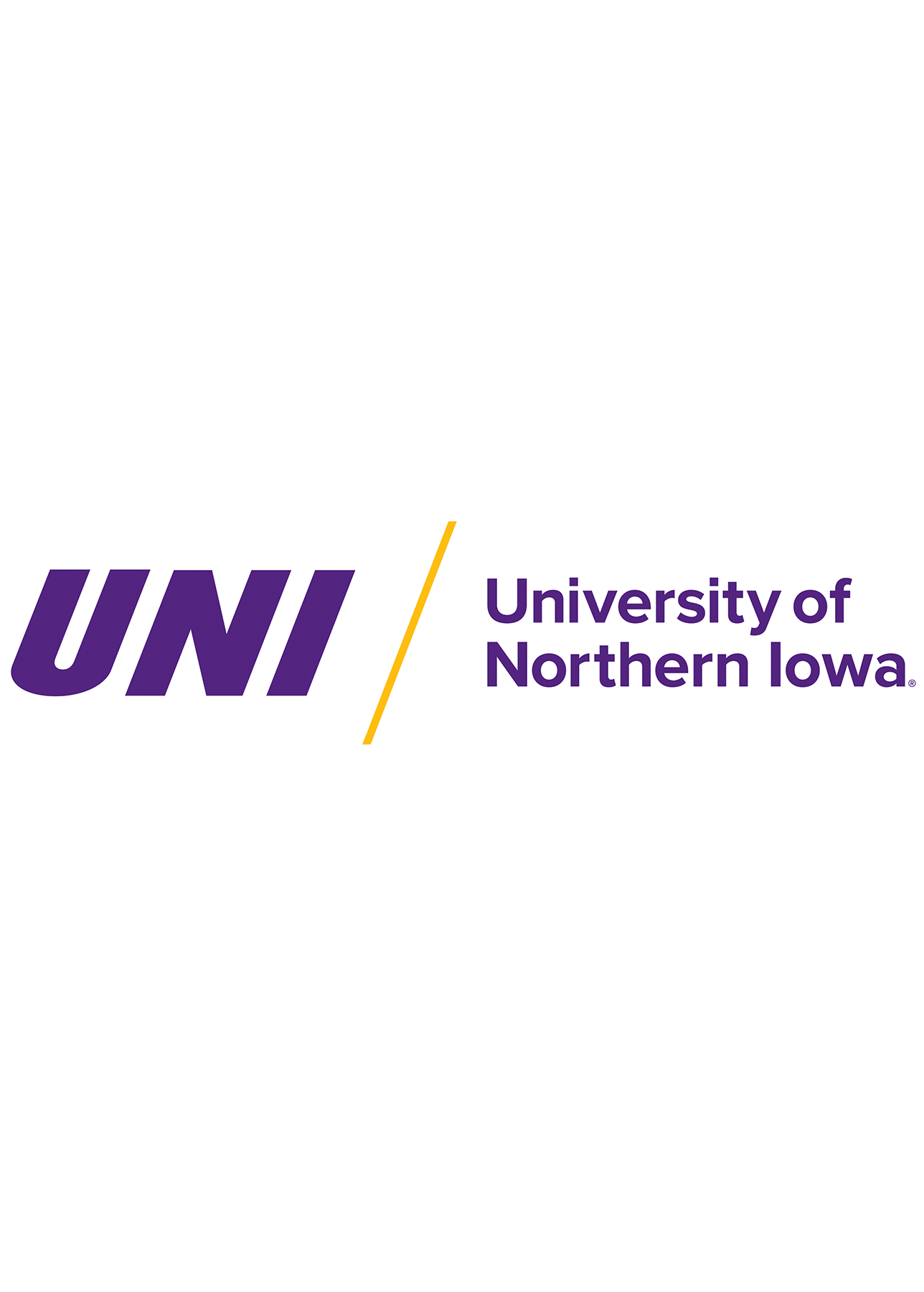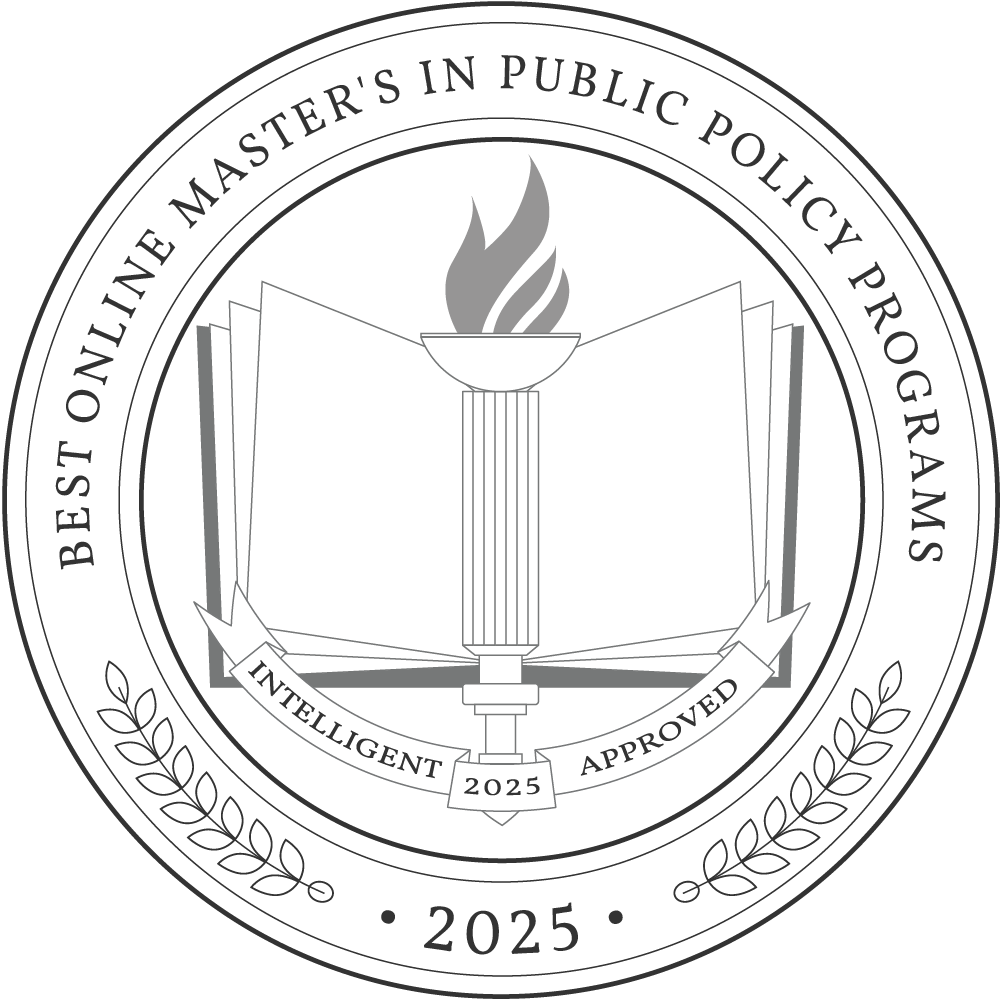Public policies are guidelines, laws, or regulations that solve public problems. An online master’s degree in public policy prepares future leaders to design, implement, and evaluate local, state, or federal public policies. Budget analysts average over $80,000 in annual salary, sociologists average over $90,000, and political scientists average well over $100,000.
Advanced degrees are beneficial for salary increases, and earning an online master’s in public policy offers a great return on investment. The average cost of graduate school tuition is $20,513 per year — you may be able to make five times that amount or even more once you have your degree.
We interviewed Blanca Villagomez, a program counselor and coordinator at UC-Irvine, who shared valuable insights and strategies to help students select a master’s degree program and thrive in an online learning environment.
Why Trust Us
The Intelligent.com Higher Education Team is dedicated to providing students with independent, equitable school and program rankings and well-researched resources. Our expert-driven articles cover topics related to online colleges and programs, paying for school, and career outlooks. We use data from the U.S. Department of Education’s College Scorecard, the National Center for Education Statistics, and other reputable educational and professional organizations. Our academic advisory team reviews content and verifies accuracy throughout the year for the most current information. Partnerships do not influence rankings or editorial decisions.
- Analyzed over 2,000 national, accredited, and nonprofit colleges and universities
- 800+ rankings pages are reviewed and updated yearly
- Content is informed by reputable sources, surveys, and interviews with academic advisors and other experts
- Over 100 data points are reviewed for accuracy and quality throughout the year, including sources
How we rank schools
Our list features the best online Public Policy degree programs at top colleges nationwide. Each school featured is a nonprofit, accredited institution — either public or private — with a high standard of academic quality for post-secondary institutions.
We evaluated each school’s program on tuition costs, admission, retention and graduation rates, faculty, reputation, and the student resources provided for online students. We collected data from trusted sources like the National Center for Education Statistics, individual school and program websites, school admissions counselors, and other data sources. Then, we calculated the Intelligent Score on a scale of 0 to 100 based on the following criterion:
Academic Quality:
- Admission rate versus enrollment rate
- Retention rate of students who return after year one
- Accreditation status (regional and programmatic)
- Nonprofit status, both private and public institutions
Graduation Rate
- Overall graduation rate
- Total number of currently enrolled students, including diversity metrics
- Student-to-faculty ratio
Cost and ROI
- In-state and out-of-state per-credit tuition rates and fees
- Required credits to graduate
- Earning potential after graduation
- Availability of federal student loans, scholarships, and other financial aid options
Student Resources
- Available student services for online-only and hybrid programs
- On-campus amenities like tutoring centers and the number of libraries
Read more about our ranking methodology.
Best 12 Online Master’s in Public Policy Programs
FiltersInstitution Type
Status
- Intelligent Score
- Alphabetically By University Name
- Acceptance Rate
- Enrollment
- In-state Graduate Tuition
- Out-of-state Graduate Tuition
- In-state Undergraduate Tuition
- Out-of-state Undergraduate Tuition

Oregon State University
Intelligent Score: 99.70In-state: $9,846
Out-of-state: $29,445
In-state: $13,257
Out-of-state: $13,257
SAT: 1080-1310
ACT: 21-29
$571
Online
Network of Schools of Public Policy, Affairs, and Administration
30-36

Liberty University
Intelligent Score: 99.34In-state: $14,791
Out-of-state: $14,791
In-state: $7,935
Out-of-state: $7,935
SAT: 1040-1250
ACT: 21-29
$565
Online
Southern Association of Colleges and Schools Commission on Colleges
36

Regent University
Intelligent Score: 97.69In-state: $17,220
Out-of-state: $17,220
In-state: $15,552
Out-of-state: $15,552
SAT: 940-1220
ACT: 21-29
$695
Online
Southern Association of Colleges and Schools Commission on Colleges
33

American University
Intelligent Score: 97.23In-state: $50,542
Out-of-state: $50,542
In-state: $34,533
Out-of-state: $34,533
SAT: 1220-1390
ACT: 27-32
$2,000
Online
Network of Schools of Public Policy, Affairs, and Administration
36

University of Pittsburgh
Intelligent Score: 96.15In-state: $18,628
Out-of-state: $32,656
In-state: $23,530
Out-of-state: $23,530
SAT: 1243-1420
ACT: 28-32
$1,038
Online
Middle States Commission on Higher Education.
30

University of Northern Iowa
Intelligent Score: 95.62In-state: $7,665
Out-of-state: $19,949
In-state: $9,159
Out-of-state: $9,159
SAT: 1030-1230
ACT: 20-26
$569
Online
Network of Schools of Public Policy, Affairs, and Administration
37

UMass Dartmouth
Intelligent Score: 94.01In-state: $15,791
Out-of-state: $35,779
In-state: $14,014
Out-of-state: $14,014
SAT: 1200-1390
ACT: 27-32
$599
Online
Network of Schools of Public Policy, Affairs, and Administration
34-36

Northwestern University
Intelligent Score: 92.33In-state: $58,227
Out-of-state: $58,227
In-state: $56,067
Out-of-state: $56,067
SAT: 1430-1550
ACT: 33-35
$1,349
Online, On-Campus, Blended
New England Commission of Higher Education
33

DePaul University
Intelligent Score: 92.13In-state: $40,551
Out-of-state: $40,551
In-state: $19,370
Out-of-state: $19,370
SAT: N/A
ACT: N/A
$788
Online
Network of Schools of Public Policy, Affairs, and Administration
34

Temple University
Intelligent Score: 91.27In-state: $16,080
Out-of-state: $28,992
In-state: $16,956
Out-of-state: $16,956
SAT: N/A
ACT: N/A
Resident: $1,053
Non-Resident: $1,449
Online
Middle States Commission on Higher Education.
36

CUNY John Jay College of Criminal Justice
Intelligent Score: 90.3In-state: $6,930
Out-of-state: $14,880
In-state: $11,090
Out-of-state: $11,090
SAT: 1170-1340
ACT: 25-31
Resident: $470
Non-Resident: $855
Online
Network of Schools of Public Policy, Affairs, and Administration
42

Empire State University
Intelligent Score: 88.79In-state: $22,984
Out-of-state: $32,894
In-state: $27,822
Out-of-state: $27,822
SAT: N/A
ACT: N/A
Resident: $471
Non-Resident: $991
Online
Middle States Commission on Higher Education.
30
How to Choose an Online Master’s in Public Policy Program
Choose your area of study
There are many career options available for those who have a Master of Public Policy (MPP) degree. Before selecting a program, consider whether you want to work for the government, nonprofit, or corporate sector.
Examples of government jobs include the following:
- Public administration
- Budget analysis
- Public relations
- Program development
Examples of nonprofit and private organization careers include:
- Policy research
- Community affairs
- Communications
- Fundraising
There are also many different types of policy that you can study, such as:
- Health policy
- Education policy
- Environmental policy
- Food and science policy
Some programs will allow you to choose a concentration and focus your studies on one of these specialties. If you already know what you would like to do after you graduate, look for programs that closely match these career goals.
“Develop a list of personalized parameters to help you narrow down graduate program options,” Villagomez suggests. “Examples include overall cost, access to financial aid, faculty expertise, duration of the program, and employment rates post-graduation. As you’re gathering information, consider which programs align with your needs and priorities at this stage in your life.”
Research schools and programs
You should only apply to institutions that have been approved by a DOE-recognized regional accrediting organization, such as the New England Commission of Higher Education or Northwest Commission on Colleges and Universities. These organizations evaluate schools to ensure they provide students with a high-quality education. Those who attend a school that isn’t regionally accredited may be unable to access financial aid or transfer credits to another institution if needed.
Ideally, your master’s in public policy program will also be accredited by a respected industry group like the Network of Schools of Public Policy, Affairs, and Administration. This programmatic accrediting organization has particularly high standards for public policy education.
Another way to research a school is to read online reviews of current and former students and staff. Interview someone from the public policy department and ask them for references from former students.
To learn more about any schools that you’re interested in, you can visit the school’s website, contact an admissions counselor, follow the school on social media, or attend an in-person or virtual open house.
Prepare for tests and applications
Application requirements vary by school and program. The application process for a master’s degree in public policy occurs in stages with deadlines for many schools. There are deadlines for submitting program-specific information and for financial aid. Missing the deadlines can mean a delay in starting the program.
Along with the application, the following information is typically required for consideration:
- Letters of recommendation
- Transcripts from an undergraduate program
- Proof of graduation and overall GPA
- Personal statement
- Resume
- Application fees
International students are typically required to pass an English proficiency test, and applicants may be required to submit Graduate Record Exam (GRE) scores as well. When ready, the application can be completed online.
Before submitting an application, always contact an admissions counselor to ensure you have the most accurate information regarding requirements and deadlines.
Select your program
There are many great master’s-level public policy programs. Choosing one over the other may come down to the extras available. For example, one school may offer more assistance for those with learning disabilities. Or, one school may have open deadlines, offering more flexibility. Other benefits to help you make a final decision include:
- Tuition assistance
- Tutoring and student assistance
- Accessibility to professors and staff
- School ranking
- Curriculum
- Diversity
- Completion rate and placement
Before making your final decision, review your needs and goals again. Do you plan to attend school full-time or part-time? Do you want your program to be as online as possible, or are you fine with a hybrid program that has a fair amount of in-person requirements? Some programs offer asynchronous courses, which can be completed at your own pace, while others only offer synchronous courses, which involve remotely attending lectures and completing assignments at the same time as other students — which of these two online learning formats do you prefer? “Despite the different modalities, all online degree programs require high self-motivation, effective time management, and structured independent study,” says Villagomez. “I recommend students create a consistent routine by identifying their optimal hours for attending classes, completing coursework, and studying to stay on track with their deadlines.”
Your school should accommodate your scheduling needs and learning preferences.
Determine how you’ll pay for your degree
The costs to getting the best online master’s in public policy can be an obstacle if you do not have a clear plan as to how you will pay for your degree. Completing the Free Application for Federal Student Aid (FAFSA) will reveal financial aid options available, including grants and loans. You should also contact the school’s financial aid office to ensure you understand the full cost of the program and see if any additional assistance options are available. Those who already work in the field should see if their employer offers tuition assistance benefits as well.
What Can You Expect from an Online Master’s in Public Policy Program?
Most master’s-level programs allow full-time students to graduate within two years. Typically, a minimum of 36 credit hours are required. With an online program, students can expect to have more flexibility in when and where they complete coursework. Check if the online program offers accelerated, dual degree, or extended options if the typical schedule is not a good fit.
To graduate, students must pass core courses, specialty courses, and policy-related internships. In addition, many programs require a thesis, final exam, seminar, or final project under the supervision of a committee of faculty in public policy.
Potential courses you’ll take in an online master’s in public policy program
- Introduction to Public Policy. Students may be required to take a foundational course that explains public policy, its importance, and how to evaluate policies. It will cover local, state, federal, nonprofit, and private organizational policy issues. Students gain an understanding of public policy analysis and decision-making.
- Nonprofit Leadership. Students learn what it takes to lead an organization, such as skills related to board governance, laws, ethics, budgeting, and staff development. The focus is on organization development, communication with the community, regulation compliance, and financial analysis.
- Law and Public Policy. Students discover the impact laws and statutes have on public policy. Those seeking careers in leadership roles will benefit from learning how to legally address public challenges and make changes within the limits of the law.
- Microeconomics. Students will learn how to study the economy related to businesses and individuals. Topics include supply, demand, production costs, and analysis of government policies. They will examine how products are made, priced, sold, and used. Students examine why people spend their money the way they do.
What Can You Do With an Online Master’s in Public Policy?
Career outlook
Earning a master’s degree in public policy empowers individuals to drive impactful change by navigating the intricacies of policymaking, analysis, and advocacy. This advanced degree equips graduates with the skills needed to address complex societal challenges and contribute to the development of effective public policies. Here are some potential career paths, showcasing the versatility of a master’s in public policy and the diverse roles graduates can undertake:
- Political scientist — Research political subjects, monitor current events, and provide analysis to organizations such as government agencies, political parties, and labor unions.
- Median annual salary: $128,020
- Projected employment growth (through 2032): 7%
- New job openings projected: 600 annually
- News analyst, reporter, or journalist — Research topics, conduct interviews, and write stories to keep the public updated on noteworthy information.
- Median annual salary: $55,960
- Projected employment growth (through 2032): -3%
- New job openings projected: 6,000 annually
- Social or community service manager — Oversee operations and secure funding for programs that support public well-being.
- Median annual salary: $74,240
- Projected employment growth (through 2032): 9%
- New job openings projected: 16,000 annually
Online Master’s in Public Policy Degree Frequently Asked Questions
How do I apply to an online master's in public policy degree program?
Because each master’s degree program in public policy has different requirements for admission, it’s essential to talk to an admissions counselor before beginning the process. Some schools offer online meetings for convenience. During the meeting, students can verify the application process and the documents they must submit, which will likely include transcripts, GRE scores, letters of recommendation, and a resume.
The application process is online, making it easy to complete and upload documents for submission.
How much does an online master's in public policy degree program cost?
The average cost of graduate school tuition is $20,513 per year. Private schools are usually more expensive than public schools, and public schools tend to charge a higher tuition rate to out-of-state students than in-state students.
In addition to tuition, there will also be extra costs associated with the program, such as:
- Textbooks
- Application fee
- Technology fee
- Student services fee
Fortunately, there are many financial aid opportunities to help students pay for the best online master’s in public policy.
How long does it take to earn an online master's in public policy degree?
Like tuition, the time it takes to earn an online master’s degree in public policy will vary for each student due to individualized factors. Programs that require a higher number of credit hours will take longer to complete. Full-time students can usually graduate within two years, while part-time students may need three years or more. Some schools also offer accelerated programs that can be completed in just one year by students who are able to take on a particularly heavy courseload.
Is an online master's in public policy worth it?
This degree is highly valuable for individuals aspiring to shape and influence public policy. The program equips students with the analytical skills, policy knowledge, and ethical frameworks necessary for impactful careers in government, nonprofits, and research.
Graduates are prepared to lead with integrity, drive evidence-based policymaking, and contribute meaningfully to addressing complex challenges. Also, the earning potential for individuals with an online master’s in public policy is highly competitive.
One of the key advantages of earning an online master’s in public policy is the flexibility it offers. “Accredited online degrees are just as reputable and legitimate as traditional degrees,” says Villagomez. “The flexibility, convenience, and accessibility of online programs can enhance students’ learning, boost their motivation, and support their retention.”
Online programs allow students to balance their education with work or other commitments, providing access to quality education without geographical constraints. This flexibility enhances opportunities for career growth and advancement.
Read More about Online Master’s in Public Policy Degrees
Compare School Options
Related Degrees
- Business Administration
- Information Technology
- Sports Management
- Organizational Leadership
- Sustainability
- Hospitality Management
- Entertainment Management
- Human Resources
- Management
- Taxation


